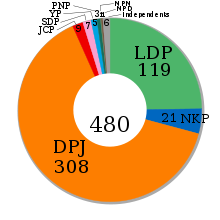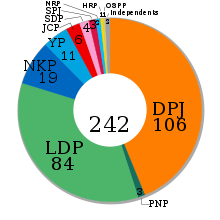- Democratic Party of Japan
-
Democratic Party
民主党
Minshutō
President Yoshihiko Noda Secretary-General Azuma Koshiishi Spokesperson Yoshiaki Takaki Councilors leader Azuma Koshiishi Representatives leader Yoshihiko Noda Founded 8 January 1998 Merger of Preceded by Democratic Party of Japan (1996-1998) Headquarters 1-11-1 Nagata-cho, Chiyoda, Tokyo 100-0014, Japan Ideology Social liberalism
Social democracy
Third WayPolitical position Centre-left [1] International affiliation Alliance of Democrats[2] Official colors Red and black (informally) Councillors 106 / 242Representatives 307 / 480Website www.dpj.or.jp Politics of Japan
Political parties
ElectionsThe Democratic Party of Japan (民主党 Minshutō) is a political party in Japan founded in 1998 by the merger of several opposition parties. Its socially liberal platform is generally considered center-left in the Japanese political spectrum.[1] After the 2009 election the DPJ became the ruling party in the House of Representatives, defeating the long-dominant Liberal Democratic Party and gaining the largest number of seats in both the House of Representatives and the House of Councillors.
It is not to be confused with the now-defunct Japan Democratic Party that merged with the Liberal Party in 1955 to form the Liberal Democratic Party. It is also different from the Democratic Party, established in 1947 and ended in 1950.
Contents
History
Main article: History of the Democratic Party of JapanPhilosophy
The Democratic Party call their philosophy Democratic Centrism (ja:民主中道 Minshu Chudo), which was determined in the first party convention on April 27, 1998.[3]
View of the status quo
The Democratic Party claim themselves to be revolutionary in that they are against the status quo and the current governing establishment. The Democratic Party argue that the bureaucracy of the Japanese government size is too large, inefficient, and saturated with cronies and that the Japanese state is too conservative and stiff. The Democratic Party wants to "overthrow the ancient régime locked in old thinking and vested interests, solve the problems at hand, and create a new, flexible, affluent society which values people's individuality and vitality."[4]
Political standpoint
“ We stand for those who have been excluded by the structure of vested interests, those who work hard and pay taxes, and for people who strive for independence despite difficult circumstances. In other words, we represent citizens, taxpayers, and consumers. We do not seek a panacea either in the free market or in the welfare state. Rather, we shall build a new road of the democratic center toward a society in which self-reliant individuals can mutually coexist and the government's role is limited to building the necessary systems.[4] ” Goals
Democratic Centrism pursues the following five goals.[4]
- Transparent, just and fair society
- Free market and inclusive society
-
- While the party argue that the free market system should "permeate" economic life, they also aim for an inclusive society which guarantees security, safety, and fair and equal opportunity for each individual.
- Decentralized and participatory society
-
- The party intend to devolve the centralized government powers to citizens, markets, and local governments so that people of all backgrounds can participate in decision-making.
- Compliance with the three constitutional principles
-
- The Democratic Party proclaim to hold the values in the meaning of the constitution to "embody the fundamental principles of the Constitution": popular sovereignty, respect for fundamental human rights, and pacifism.[4]
- International relations based on self-reliance and mutual coexistence
-
- As a member of the global community, the party seek to establish Japan's international relations in the fraternal spirit of self-reliance and mutual coexistence to restore the world's trust in the country.[4]
Policy platforms
The DPJ's policy platforms include the restructuring of civil service, monthly allowance to a family with children (¥26,000 per child), cut in gas tax, income support for farmers, free tuition for public high schools, banning of temporary work in manufacturing,[5] raising the minimum-wage to ¥1,000 and halting of increase in sales tax for the next four years.[6][7]
Structure
- Supreme Advisers - Tsutomu Hata,Kozo Watanabe,Yukio Hatoyama,Naoto Kan,Katsuya Okada,Satsuki Eda,Hirohisa Fujii
- President - Yoshihiko Noda
- Vice Presidents:
- Masayuki Naoshima
- Toshimi Kitazawa
- Tomiko Okazaki
- Keishu Tanaka
- Secretary General - Azuma Koshiishi
- Acting Secretary General - Sinji Tarutoko
- Deputy Secretary General - Koriki Jojima
- Chair, Policy Research Committee - Seiji Maehara
- Chair, Diet Affairs Committee - Hirofumi Hirano
- Chair, DPJ Caucus, House of Councillors - Azuma Koshiishi
- Secretary General, DPJ Caucus, House of Councillors - Kenji Hirata
- Chair, Diet Affairs Committee, DPJ Caucus,House of Councillors - Yuichiro Hata
- Chair, Administration Committee - Naoki Tanaka
- Chair, Election Campaign Committee - Yoshiaki Takaki
- Chair, Financial Committee - Koichi Takemasa
- Chair, Organisation Committee - Shinichiro Hurumoto
- Chair, Public Relations Committee - Tadashi Hirono
- Chair, Corporate & External Organisations Committee - Shuji Ikemoto
- Chair, National Rallying and Canvassing Committee - Yosuke Kondo
- Chair, Standing Officers Council - Kansei Nakano
Factions
The DPJ has some political factions or groups, although they are not as factionalized as the LDP, which has traditionally placed high priority on intra-party factional alignment. The groups are, from the most influential to the least influential:
- Isshin-kai: supporters of the former LDP leader Ichirō Ozawa. About 50 members.[8]
- Ryōun-kai: the second most conservative faction. Most of its members are from The Sakigake Party. Ryoun-kai has about 40 seats in the assembly and is led by Seiji Maehara and Yoshihiko Noda.[8]
- Seiken kōyaku wo Jitsugen suru kai: formed by defectors from LDP and led by former party leader Yukio Hatoyama, has about conservative 30 lawmakers in the Diet. Former name is 'Seiken kotai wo Jitsugen suru kai'.[8]
- Minsha Kyōkai: members of the former centrist Democratic Socialist Party which merged with the DPJ early on. About 25 members, led by Tatsuo Kawabata.[8]
- Kuni no katachi kenkyūkai: led by Party President Naoto Kan. Is a liberal leaning faction. About 20 members.[8]
- Shin seikyoku kondankai: the most left-leaning faction, created by members of the former Japan Socialist Party who felt the Social Democratic Party was too radical. About 20 seats, led by Takahiro Yokomichi.[8]
The Independent’s Club is a minor political party which forms a political entity with the DPJ in both chambers of the house.
Presidents of DPJ
The Presidents of Democratic Party of Japan (ja:民主党代表 Minshutō Daihyō), the formal name is 民主党常任幹事会代表 (Minshutō Jyōnin-Kanji-Kai Daihyō).
No. Name Term of office Image Election results Rōmaji Kanji Took Office Left Office 1 Naoto Kan 菅 直人 27 April 1998 18 January 1999 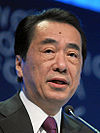
unchallenged 18 January 1999 25 September 1999 Naoto Kan - 180
Shigefumi Matsuzawa - 51
Abstention - 82 Yukio Hatoyama 鳩山 由紀夫 25 September 1999 9 September 2000 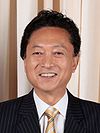
Yukio Hatoyama - 182
Naoto Kan - 1309 September 2000 23 September 2002 walkover 23 September 2002 10 December 2002 Yukio Hatoyama - 254
Naoto Kan - 2423 Naoto Kan 菅 直人 10 December 2002 18 May 2004 
Naoto Kan - 104
Katsuya Okada - 794 Katsuya Okada 岡田 克也 18 May 2004 13 September 2004 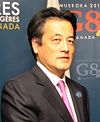
unchallenged 13 September 2004 17 September 2005 walkover 5 Seiji Maehara 前原 誠司 17 September 2005 7 April 2006 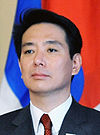
Seiji Maehara - 96
Naoto Kan - 94
Abstention - 36 Ichirō Ozawa 小沢 一郎 7 April 2006 12 September 2006 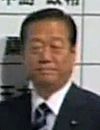
Ichirō Ozawa - 119
Naoto Kan - 7312 September 2006 21 September 2008 walkover 21 September 2008 16 May 2009 walkover 7 Yukio Hatoyama 鳩山 由紀夫 16 May 2009 4 June 2010 
see election 2009
Yukio Hatoyama - 124
Katsuya Okada - 958 Naoto Kan 菅 直人 4 June 2010 14 September 2010 
see election Jun 2010
Naoto Kan - 291
Shinji Tarutoko - 12914 September 2010 29 August 2011 see election Sep 2010
Naoto Kan - 721
Ichirō Ozawa - 4919 Yoshihiko Noda 野田 佳彦 29 August 2011 Incumbent 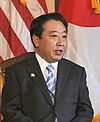
see election 2011
Yoshihiko Noda - 215
Banri Kaieda - 177Election results
All-time highest values are bolded
General election results
Election Leader # of candidates # of seats won # of PR Block votes % of PR Block vote # of Constituency votes % of Constituency vote 2000 Yukio Hatoyama 262 127 15,067,990 25.18% 16,811,732 27.61% 2003 Naoto Kan 277 177 22,095,636 37.39% 21,814,154 36.66% 2005 Katsuya Okada 299 113 21,036,425 31.02% 24,804,786 36.44% 2009 Yukio Hatoyama 330 308 29,844,799 42.41% 33,475,334 47.43% Councillors election results
Election Leader # of seats total # of seats won # of PR Block votes % of PR Block vote # of Constituency votes % of Constituency vote 1998 Naoto Kan 47 27 12,209,685 21.75% 9,063,939 16.20% 2001 Yukio Hatoyama 59 33 8,990,524 16.42% 10,066,552 18.53% 2004 Katsuya Okada 82 50 21,137,457 37.79% 21,931,984 39.09% 2007 Ichirō Ozawa 109 60 23,256,247 39.48% 24,006,817 40.45% 2010 Naoto Kan 106 44 18,450,139 31.56% 22,756,000 38.97% See also
- Politics of Japan
- Marutei Tsurunen: Japan's first deputy of European origin
References
- ^ a b US reaches out as Japan shifts left, AFP,
- ^ Political Parties, International Organizations and Individuals joining the Alliance of Democrats, Alliance of Democrats
- ^ Out Basic Philosophy - Building a free and secure society on The Democratic Party of Japan's website accessed on May 12, 2010.(Japanese)
- ^ a b c d e Out Basic Philosophy - Building a free and secure society on The Democratic Party of Japan's website accessed on 17 May 2008.
- ^ Ryall, Julian (2009-08-27). "Japan election: unemployed turn on the government". London: The Daily Telegraph. http://www.telegraph.co.uk/news/worldnews/asia/japan/6098808/Japan-election-unemployed-turn-on-the-government.html. Retrieved 1 May 2010.
- ^ Hiroko Tabuchi (2009-08-03). "Opposition Woos Japan's Voters With Costly Vows". New York Times. http://www.nytimes.com/2009/08/04/business/global/04yen.html.
- ^ Fujioka, Chisa (2009-08-21). "Japan opposition may score landslide win: media". Reuters. http://www.reuters.com/article/worldNews/idUSTRE57L08020090822.
- ^ a b c d e f 民主代表選 鳩山氏が優位、岡田氏は参院に照準, Asahi Shimbun, 16 May 2009
Further reading
- Japan after Kan: Implications for the DPJ’s Political Future, Q&A with Richard J. Samuels (MIT) August 2011
- Daniel Sneider, The New Asianism: Japanese Foreign Policy under the Democratic Party of Japan (Asia Policy, July 2011)
- Leif-Eric Easley, Tetsuo Kotani and Aki Mori, Electing a New Japanese Security Policy? Examining Foreign Policy Visions within the Democratic Party of Japan (Asia Policy, August 2009)
External links
- Democratic Party of Japan (English)
- Democratic Party of Japan (Japanese)
Political parties in Japan 
Major parties Democratic · Liberal DemocraticThird parties New Komeito · Your · Japanese Communist · Social Democratic · People's New · Sunrise · New Renaissance · NipponOther parties with Diet seats Major parties with local council seats Portal:Politics - List of political parties - Politics of Japan Categories:- 1998 establishments in Japan
- Liberal parties
- Social democratic parties
- Political parties in Japan
- Political parties established in 1998
Wikimedia Foundation. 2010.

